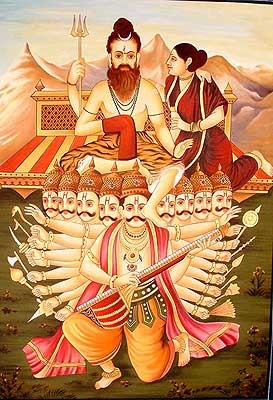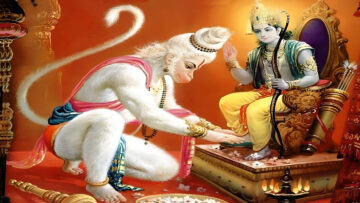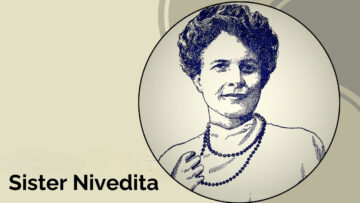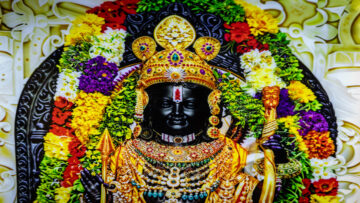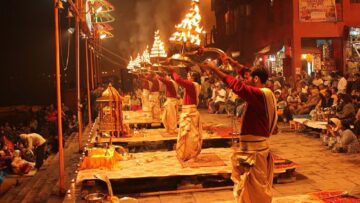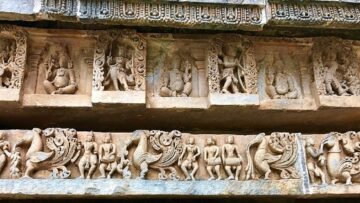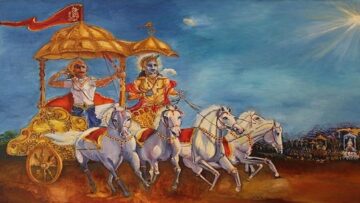Benefits of Studying our Scriptures
- Means of attaining all the goals of our Life
Hindu Dharma states that every human being should have four aims in life: Artha (material possessions), Kāma (gratification of senses), Dharma (piety, performing one’s duty) and Moksha (liberation from the cycle of births and deaths). These goals might seem mutually irreconcilable, but the scriptures provide ways and means and frameworks for our lives and the society so that all of them can be achieved in a harmonious manner.
With the eyes of knowledge, a wise man should closely examine all the sources of Dharma, and then determine and practice that Dharma which is in accordance with the Vedas. Manusmriti 2.8 Following the Dharma taught in the Shruti and the Smriti, one obtains great fame in this life, and attains a state of great happiness upon death. Manusmriti 2.9
By Shruti is meant the Veda, and by Smriti is meant the Dharmashāstra. Dharma has originated from these two main sources, and therefore one should not find fault in them unnecessarily. Manusmriti 2.10
The four varnas, the three worlds, the four ashramas, the past, present and future are all known well through the Vedas alone. Manusmriti 12.97
The Vedas sustains all creatures and promotes their success/progress – therefore I consider the Vedas as the best means of attaining one’s goals. Manusmriti 12.99
“… A young man working in the Indian Army could not find any meaning in life and so contemplated suicide while sitting on a bench at Delhi Railway Station. But, suddenly he remembered that his sister was to get married shortly. So, he decided to postpone his suicide mission until the marriage or his sister. Next day, he went to a book shop to purchase newspaper when he came across a book by Swami Vivekananda which contained many inspiring thoughts like – ‘This life is short, the vanities of the world are transient. They alone live who live for others; the rest are more dead than alive.’ He made up his mind to live for others. Afterwards he took premature retirement from Army and received Rs. 65,000/ – as retirement benefits. He went to his village in Maharashtra and utilized this money to repair the village temple. With the temple as the focal point, he mobilized public opinion and stopped all liquor outlets in the village despite stiff resistance from the vested interests. He educated the villagers, both young and old, and started many economic projects. In a few years, his village was declared an ideal village by the Government. The Maharashtra Government then released grant for transforming some more villages. The name of the village is Ralegaon Siddhi and the person’s name is Anna Hazare. He was awarded Padmasri and then Padma Bhushan for his work. Just a small book by Swami Vivekananda gave a new direction in Anna Hazare’s life.”[1]
- Golden Standard for judging Good from Evil
Scriptures, and especially the Vedas, are the yardstick by which we measure the morality of our actions and judge whether we are right or wrong.
With the eyes of knowledge, a wise man should closely examine all the sources of Dharma, and then determine and practice that Dharma which is in accordance with the Vedas. Manusmriti 2.8By Shruti is meant the Veda, and by Smriti is meant the Dharmashāstra. Dharma has originated from these two main sources, and therefore one should not find fault in them unnecessarily. Manusmriti 2.10
In the Bhagavad Gita, Lord Krishna censures those persons who act without regard to scriptural directives:
He who, having cast aside the commandments of the scriptures, acts under the impulse of desire, attains neither spiritual powers, nor happiness, nor the Supreme Goal. Gita 16.23
Therefore, let the scriptures be your authority, in determining what should be done and what should not be done. You should perform your actions in this life only after knowing what is said in the commandments of the scripture. Gita 16.24
When we read our scriptures, we learn how we can live a virtuous life and why doing evil does not benefit us in the long run.
- Provide Supra-sensuous Answers to difficult Questions about Life and Universe
Hindu Dharma seeks to address core questions related to our being – Who are we? What are we here for? Where do we go? What happens when we die? And so on. The answers to these questions are supra-sensuous, and cannot be determined through logical reasoning, or scientific experimentation. Hindus believe that our Holy books contain the wisdom of spiritually enlightened Rishis, Saints and Sages who had realized and understood these supra-sensuous or paranormal truths and therefore a study of these scriptures can help us answer our fundamental questions and doubts. In fact, Hindu schools of philosophy maintain that scriptures are the only perfect means of finding the true nature of Dharma and God because their true nature cannot be ascertained beyond doubt through other means such as perception by senses, or by logical inferences.
The Vedas are the eternal eye of the ancestors, devas and humans. Vedic teaching is beyond perception by senses and beyond logic – this is the established rule. Manusmriti 12.94Sense perception results when a person’s senses come into contact with an object that is present and can be perceived. But perception cannot be a means for knowing eternal Dharma because it is not a material object that can be perceived. On the contrary, the Vedas are an independent and infallible means of knowing imperceptible Dharma, and the relationship between the letters and meaning of Vedas is eternal – so says Bādarāyaṇa. Jaimini’s Pūrva Mimāmsā Sūtras 1.1.4-5
Brahman (Supreme Being) is not known from perception by senses or by logical inferences because he can be understood only through scriptures. Vedānta Sūtra 1.1.3
- Collected Wisdom of Several Millennia
We can all eventually learn the principles of Physics, Chemistry etc. on our own if we spend ages trying to observe things first hand without the benefit of using any texts on these subjects or study under any teacher. But no one wastes time and energy in learning first hand through endless experimentation when one can conveniently learn from reliable books. Likewise, Hindus should consult and study the scriptures that contain collected wisdom on Dharma and Moksha instead of trying to figure it out again, and re-invent the wheel.
- Substitute for other Dharmic Practices
Certain acts of Dharma such as charity, construction of temples, rituals and so on require wealth. So what should a poor person do? Hindu scriptures state that a person who is unable of performing rituals should still not abandon practices such as study and recitation of the Vedas.
Even if a Brahmana stops performing Vedic rituals, he should nevertheless exert to study the Vedas, acquire spiritual wisdom and control his senses. Manusmriti 12.92
- Save us from Sins
Reflection upon and recitation of specific hymns from holy books helps us in reducing the burdens of our sins.
Regular study and recitation of scriptures, performance of the five great daily duties and forgiving others – these save a person from the greatest sins. Manusmriti 11.245
By studying the Rigveda, Yajurveda and Sāmaveda together with their Brāhmaṇas and Upanishads three times with a focused mind, one becomes free from all sins. Manusmriti 11.262
Good deeds to not necessarily cancel the results (or fruit) of bad deeds, and therefore, one must reap their fruits independently. However, there are a few good deeds that are exceptions and can cancel the results of bad deeds. Scriptural study is one of these exceptional good deeds.
Story: Ekanath’s son-in-law overcomes his bad habits with the help of Bhagavad Gita
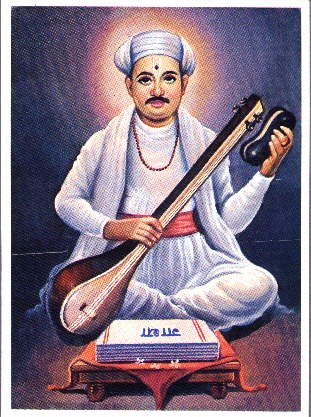 Sant Eknath was a renowned saint of Maharashtra. He married his daughter to a famous scholar (Pandit) of the region. Unfortunately, this scholar fell into bad company. He started going out of his home late in the night, leaving his wife alone. Eknath’s daughter became very worried about her husband’s behavior and she spoke to her father about it.
Sant Eknath was a renowned saint of Maharashtra. He married his daughter to a famous scholar (Pandit) of the region. Unfortunately, this scholar fell into bad company. He started going out of his home late in the night, leaving his wife alone. Eknath’s daughter became very worried about her husband’s behavior and she spoke to her father about it.
Eknath then called his son in law and said, “Look here my son in law. You are a learned man, but my daughter is not. Do her a favor. Before you leave your home every night, please read to her a verse or two of the Bhagavad Gita. This will benefit her greatly. Then, you can go out wherever you please.” The Pandit agreed. So every night before he stepped out, he would read a couple of verses of the Bhagavad Gita to his wife, and explain the meaning to her. Slowly and slowly, the Pandit realized how beautiful the teachings of the Bhagavad Gita were. They started having an influence on how own mind. After some time, with the effect of the Gita, the Pandit stopped going out at the night. He had not intended to study the Gita for his own benefit. But nevertheless, the study of the holy book for the sake of his wife impacted him too in a positive way, and he became a virtuous man.
A traditional story is narrated from the times of the virtuous and scholarly king Raja Bhoja, who ruled central India in the 11th century CE. In his kingdom, there lived a virtuous Brahmana who was very learned in Hindu scriptures, but was very poor. The Brahmana was too proud to beg for food. But one day, he was so overcome by the hardships of poverty that he decided to rob Raja Bhoja’s palace.
He somehow entered the palace on a dark night, and reached the chamber in which the King was sleeping with his queen. Expensive jewels, gold jewelry and other costly items were scattered all across the room. The Brahmana could have stolen some of them, but just at that moment, he recalled the teachings of scriptures that one must not steal. Heeding the teaching, he refrained from the evil act. But now, he was realized that the sun was rising on the horizon and darkness was vanishing rapidly. There was no way he could free from the palace in daylight. Scared, he quickly hid under the bed of the King.
Soon thereafter royal attendants arrived to awaken the King and the Queen with song and music. The King got out of the bed in a good mood, and said three quarters of a verse that praised the joys and pleasures of his life.
When the Brahmana heard these words, he could not restrain himself and uttered the fourth quarter of the verse, “But none of these remain when the eyes are shut.”
Startled the King bent down and saw him. His guards rushed to arrest the Brahmana. The King asked him the reason for his hiding. The Brahmana narrated how he wanted to rob the palace but that he recalled the words of shāstras at that very moment and therefore stopped himself. The King was pleased to hear the truthful Brahmana and said, “Since you have practiced the teachings of our scriptures, I will not let you go away empty handed. You certainly seem to be a scholar because you completed my verse. And I value scholarship and give gifts to poets in my kingdom.” Saying this, Raja Bhoja ordered that the Brahmana be sent away with costly presents.[2]
- Help us in knowing the truth about our multiple Lives
Hindus also believe that an intensive study of scriptures assists in recollection of our past lives. And when we learn about our former existences in different forms, we get less attached to this material world, and become inclined towards the path of spirituality, eventually resulting in Moksha.
Through constant study of the Vedas, austerities, purity (of mind and body) and absence of any hatred towards other creatures, a person comes to recollect his former lives. Recollecting one’s previous lives, such a person then becomes devoted to Brahman, and as a result, he attains the blissful state of Moksha. Manusmriti 4.148-149
When we remember our previous lives, we see the futility and the triviality of our current life in the larger scheme of things. And therefore, we start getting drawn towards the more real, and permanent entities, such as our soul, which survives multiple bodies; and God, who transcends the entire creation in space and time.
- Provide a Starting Point for one’s Spiritual Journey
Reading scriptures is one of the means by which we can purify our bodies and minds, and make it a fit receptacle for spiritual enlightenment.
Practice of Tapas (austerity and forbearance), svādhyāya and Ishvara-prāṇidhāna (resigning oneself to God’s will, and offering him the fruits of all of one’s actions) are recommended as a starting point for those who desire to progress along the path of Yoga, but whose mind is unsteady…. svādhyāya means recitation of ‘Om’ and other sacred purifying scriptural statements, and study of spiritual scriptures.Patanjali’s Yogasūtra 2.1 and Vyāsa’s commentary on it (paraphrased)
Through recitation of scriptures, performance of religious vows (vrata), performance of homa (daily Vedic ritual), study of the Vedas, daily offerings, birth of children, five great daily sacrifices and Vedic sacrifices, one’s body becomes Divine and holy. Manusmriti 2.28
The practice of Dharma does not necessarily have to involve grand and great deeds. One can do great deeds in a small way every day, and this is the basis of the performance of the five great daily sacrifices. Studying a portion of the scriptures every day is one of these five great daily sacrifices.
- Assist Practice of Spiritual Disciplines such as Yoga
Study of scriptures has a synergistic relationship with the practice of Yoga and aids in the attainment of Moksha-
The mind of the Yogi who constantly repeats ‘Om’, and reflects on its meaning and significance simultaneously becomes very focused and attentive. And so it has been said- “Let the Yoga be practiced through svādhyāya and let svādhyāya be facilitated through the practice of Yoga. By practicing Yoga and svādhyāya together, the Supreme Ātman (God) shines (in the heart of the Yogi).”Vyāsa’s commentary on Patanjali’s Yogasūtra 1.28
Rishis, Brahmanas and householders can enhance their wisdom and austerity, as well as purify their body by studying the Vedas and the Upanishads. Manusmriti 6.30
Study of the Vedas, austerity, spiritual enlightenment, control over one’s senses, service towards one’s Guru and Ahimsa, these six lead to the greatest good (Moksha). Manusmriti 12.83
- Result in Spiritual Visions, help in Divine Interventions
Study of Scriptures is indeed known to be productive of good results. It gives one the peace of mind, and leads to a direct vision of the Devas.
The Devas, Rishis and Siddhas (spiritual masters) become visible to who is given to svādhyāya, and they assist him in his tasks.
Vyāsa’s commentary on Patanjali’s Yogasūtra 2.44
Therefore, a regular study of scriptures accelerates our spiritual growth.
- Beneficial effect on Minds and Body
The very act of recitation of Vedic scriptures is said to have a beneficial effect on our minds due to the combination of the sounds involved, and their soothing teachings. Study of scriptures gives peace to one’s mind and directs us towards the path of virtue and happiness.
He who studies all the Vedas is freed of all sorrows before long. He who practices purifying Dharma is worshipped in Heaven. Brihaspati Smriti 79
Therefore, in times of great sorrow (such as the death of a family member); it is a common Hindu practice to organize a public recitation and sermon of Hindu scriptures.
- Means for Worshipping Rishis and Repaying our Debt to them
Hindu scriptures are a sacred inheritance of all human beings. They are the wisdom of the Rishis and have been passed on from generation to generation to our present times by a devoted and continuous string of teachers and students. Therefore it is our duty to continue the tradition of their study and teaching. Many saints and sages have recommended the study of scriptures and Hindus should feel obliged to follow their advice.
Hindu scriptures say that we are all born with a triple debt – the debt towards Devas, debt towards the Rishis and debt towards our elders. The debt towards Rishis is repaid only by reading the scriptures. Therefore, Hindu scriptures state that study and recitation of Vedas is a form of worshipping the Rishis themselves.
Do not neglect the study and teaching of scriptures. Taittiriya Upanishad 1.11.1
And for in as much as a person is bound to study the Veda, for that reason he is born with a debt owed to the Rishis. Therefore, he studies the Vedas to repay that debt, and one who has studies the Vedas is called the guardian of the treasure of Rishis. Shukla Yajurveda’s Mādhyandina Shatapatha Brāhmaṇa 1.7.2.3
Rishis are worshipped through svādhyāya. Manusmriti 3.81
- Pleasing to the Lord
Hindu scriptures also state that recitation of the Vedas and other scriptures are pleasing to Lord Vishnu and other Deities, due to which their devotees should do the same regularly.
Story: Ravana chants the Samaveda to get his Freedom
When the arrogant Ravana tried to uproot and lift Mount Kailash (the abode of Shiva) in his hands, Shiva taught him a lesson by pressing the mountain with a toe and crushing Ravana below it. Ravana was trapped, and was not able to extricate himself out of the mountain. The Rishis advised him to chant the Samaveda, as Bhagavān Shiva loved to hear its chanting.
Ravana followed their advice and started chanting Mantras from the Samaveda. Soon, Shiva was pleased and He released Ravana from the mountain. Shiva also granted him a boon.
- Teaching of Scriptures to Others earns Religious Merit
We should study our scriptures so that we can teach them to others. Teaching scriptures to others is an act of charity or gift, and in fact this gift is more exalted than many other forms of charity:
The gift of Vedic learning is the best of all gifts because the Vedas are the repository of all Dharma. The donor of Vedas dwells in Brahmaloka (the Supreme Abode) forever. Yājñavalkya Smriti 1.212
- Non Religious Reasons for Studying Hindu Scriptures
It is fruitful to study Hindu scriptures for several other reasons:
- The doctrines and logic of Pūrva Mimāmsā related scriptures are the basis of the Hindu personal law in India. Likewise, a study of the Nyāya Sūtras and other associated scriptures is beneficial for acquiring skills of logic and debating.
- Hindu scriptures are amongst the oldest surviving and living religions traditions in the world. As such, a study of these texts is essential for understanding our past, and the development of religious ideas of the entire humanity as a whole.
- Hindu scriptures can also be studied to gain insights into historical linguistics, history, and ancient mathematics, music, grammar etc.
- Several Hindu scriptures are a delight to study from the perspective of appreciating good poetry.
- There is an astonishing amount of information on medicine, statecraft etc., in Hindu scriptures and scholars are still unraveling bits of this knowledge.
John Hanning Speke, who discovered the source of the Nile river in Lake Victoria in 1862 CE, wrote “The Journal of the Discovery of the Source of the Nile” a year later. In his Journal, the British explorer claims that he discovered the location of the source of the river in descriptions of the region in the Skanda Purāṇa, a Hindu scripture!
References
[1] Swami Nikhileshwarananda (2015), pp. 17-18
[2] Chaitanya and Chakra, pp. 662-663
Featured Image Credit: istockphoto.com
(This article was published by IndiaFacts in 2018)
Disclaimer: The opinions expressed in this article belong to the author. Indic Today is neither responsible nor liable for the accuracy, completeness, suitability, or validity of any information in the article.


